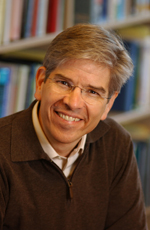Stanford economist to lecture in Rapaporte Treasure Hall
Paul Romer talks about Economic Development and the Dynamics of Rules

Paul Romer, senior fellow, Stanford Center for International Development and Stanford Institute for Economic Policy Research, will give a talk at 4:30 p.m. today in Rapaporte Treasure Hall on economic development and the dynamics of rules. Find more information here.
The lecture is sponsored by the Ellen Lasher Kaplan ’64 and Robert S. Kaplan Endowment for Economic Growth and the International and Global Studies program.
Romer is one of the leading economists of our time, as well as an activist and entrepreneur. Named by Time magazine in 1997 as one of America’s twenty-five most influential people, he has taught at Stanford’s Graduate School of Business, the University of California at Berkeley, the University of Chicago, and the University of Rochester. He is a fellow of the American Academy of Arts and Sciences and received the Rectenwald Prize in Economics in 2002.
In his online biography, he wrote: “Over time, it became clear to me that we will not understand the deep dynamics of technological ideas until we understand the dynamics of another type of idea, the rules that people follow. The patent system is a set of rules that encourages the discovery of new technologies. So is our system of open science. Rules that limit direct foreign investment can keep ideas from spreading to poor countries. So can rules (and systems of enforcement) that allow high levels of crime. As we interact with more people, the rules become more important and more complicated.
In my current work on rules, I have come full circle. I’m starting with a pressing policy concern: How can people living in places like Haiti, the Democratic Republic of the Congo, or Cuba get access to rules that protect them and let them engage in mutually beneficial exchange with others from all over the world? As Avner Grief and Douglass North have already shown, rules raise deeper theoretical issues than technologies. I’m convinced that practical progress and theoretical insight are more likely if we take the practical concerns seriously, as I've done with the suggestion that countries build charter cities."





